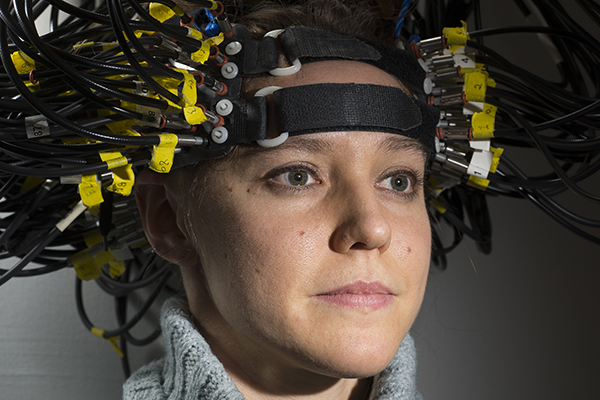Genetic errors linked to more ALS cases than scientists had thought
Genetic mutations may cause more cases of amyotrophic
lateral sclerosis (ALS) than scientists previously had realized, according
to researchers. Shown are study authors Janet Cady, a PhD candidate, and Matthew Harms, MD, assistant professor of neurology at the School of Medicine.
Alzheimer’s disease, other conditions linked to prion-like proteins
A new theory about disorders that attack the brain and spinal column has received a significant boost from scientists at the School of Medicine. The theory links these conditions to corrupted proteins known as prions, which appear bright green in this image of brain cells from a patient with Alzheimer’s disease.
Optical brain scanner goes where other brain scanners can’t
Scientists have advanced a brain-scanning technology that tracks what the brain is doing by shining dozens of tiny LED lights on the head. The technique compares favorably to other approaches but avoids the radiation exposure and bulky magnets the others require, according to new research at the School of Medicine.
Broken cellular ‘clock’ linked to brain damage
A new discovery may help explain the surprisingly strong connections between sleep problems and neurodegenerative conditions such as Alzheimer’s disease. Loss of a gene that helps keep track of time makes brain cells more vulnerable to damage from dangerous compounds known as free radicals.
Researchers identify gene for rare dementia
Studying family members suspected of having Alzheimer’s disease, researchers at Washington University School of Medicine in St. Louis have identified a gene that causes a rare disorder highlighted by memory loss and motor impairments. The condition is known as Kufs disease, but scientists say the discovery paves the way to development of a genetic test for Kufs and to therapies to treat dementia, which is a hallmark of Kufs and of other neurodegenerative conditions, such as Alzheimer’s disease.
Disruption of nerve cell supply chain may contribute to Parkinson’s
New data offer hints to why Parkinson’s disease so selectively harms brain cells that produce the chemical dopamine, says Karen O’Malley, PhD, a researcher at Washington University School of Medicine in St. Louis.
Multiple sclerosis blocked in mouse model
Scientists have blocked harmful immune cells from entering the brain in mice with a condition similar to multiple sclerosis (MS), believed to be caused by misdirected immune cells that enter the brain and damage myelin, an insulating material on the branches of neurons that conduct nerve impulses.
Sensitivity to alcohol affected by genes active in neurons
In these brain sections of neonatal mice exposed to ethanol, mice deficient in certain enzymes (right) exhibit much more neurodegeneration as indicated by the black material in the dying neurons.Can you blame your genes if you can’t handle your liquor? A new study conducted at the School of Medicine may pave the way to finding out. Researchers found that the brain’s response to alcohol is partially under the influence of two genes. The genes, studied in both adult and newborn mice, were found to affect sensitivity to alcohol intoxication, interest in alcohol consumption and risk of developmental brain damage from alcohol.
Sensitivity to alcohol affected by genes active in neurons
In these brain sections of neonatal mice exposed to ethanol, mice deficient in certain enzymes (right) exhibit much more neurodegeneration as indicated by the black material in the dying neurons.Can you blame your genes if you can’t handle your liquor? A new study conducted at Washington University School of Medicine in St. Louis may pave the way to finding out. Researchers found that the brain’s response to alcohol is partially under the influence of two genes. The genes, studied in both adult and newborn mice, were found to affect sensitivity to alcohol intoxication, interest in alcohol consumption and risk of developmental brain damage from alcohol.

